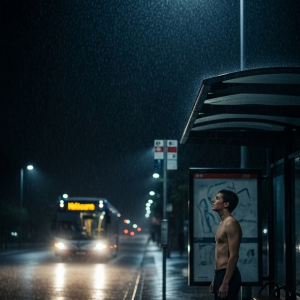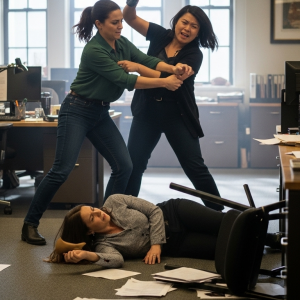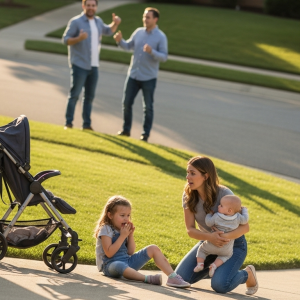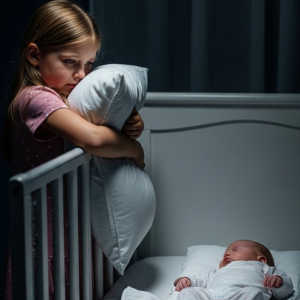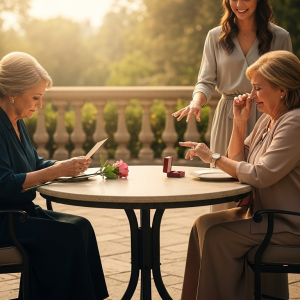My older brother, Dave, has always operated under one simple rule: what’s mine is his, and what’s his is also his. Despite only a one-year age gap, he was the golden child, and I was the convenient punching bag and scapegoat. So, it was no surprise that I moved out the day I turned eighteen.
My uncle, a now-retired police officer, took me in. He was the father I always wished I’d had, and when I needed a car, he hooked me up with a decommissioned Crown Victoria from his old department. It was a beast, and I loved it. That car was more than just transportation; it was a symbol of my escape, a fortress of solitude on wheels.
Naturally, Dave hated it. He burned through three beater cars, each one ending its life in a spectacular failure of his own making. After his third car met its end against a telephone pole, he asked to borrow my Crown Vic. A cold feeling washed over me. “No,” I told him. “You’re so entitled!” he sneered. “I need it to get to work.” “Take the bus,” I said. “I know how you drive. The car is off-limits.”
My parents called next, their voices dripping with disappointment. “Just lend him the car, honey.” I stood firm. I needed the car for my own job, and Dave’s irresponsibility wasn’t my problem. My uncle, overhearing the call, gave me a proud high-five.
A few days later, I walked out of work to find an empty parking spot where my car should have been. I called Dave; he didn’t pick up. I called my parents. They denied everything until I threatened to call the police. “He just borrowed it! He needed it!” my mother confessed.
“He better bring it back right now,” I said, my voice dangerously calm, “or I’ll have the police looking for him.”
He showed up twenty minutes later, smug. When I demanded to know how he’d stolen it, he dangled a set of police-issue Crown Vic master keys he’d bought online. “If you ever do this again,” I warned, “I will have you arrested.” He then had the audacity to ask for a ride home. “You made me wait in the December cold after stealing my car,” I said. “You can walk.”
After that, my uncle installed a tracking device in the car. A small, secret piece of insurance.
Christmas Day. The roads were a slick sheet of ice. I drove to my parents’ house with extreme care, a knot of unease in my stomach. The party was in full swing, a performance of holiday cheer that always felt hollow. An hour in, I glanced out the front window. The empty space where my Crown Vic should have been screamed at me.
I pulled out my phone and opened the tracking app. A small dot, my car, was a few miles away. I called Dave, my hands shaking with rage. “Dave stole my car again!” I announced to the room. My uncle’s face darkened. “Screw off,” Dave slurred over the phone when I reached him. “I’ll be back soon.” “You better not have been drinking,” I started, but he hung up.
I watched the tracker, a helpless observer as the dot moved erratically. Then, it stopped. A few minutes later, a panicked call from Dave. “I need help! I crashed the car!”
We piled into my parents’ minivan and followed the tracker’s signal. We found him on the side of a dark road. My Crown Vic was nose-deep in a snow-filled ditch. My uncle was furious. I was beyond mad.
“That’s it,” I said, pulling out my phone. “I’m calling the police.” “No, don’t!” Dave begged, terror in his eyes. “I’ve been drinking. I’ll get a DUI.” “Then you’re paying for my damned car, or I’ll sue you,” I seethed.
As if on cue, the blue and red lights of a police cruiser washed over the scene. Someone else had already called it in. My parents immediately went into damage control mode, lying with a practiced ease that turned my stomach. “Oh, officers, thank goodness. Our daughter crashed her car, we just got here to help.”
“That’s not true,” I said, stepping forward. My uncle backed me up, and one of the officers recognized him from the force. After a quiet chat with my uncle, the officers approached Dave. They asked for his license, which, I then learned, was already suspended from his last crash. A breathalyzer test later, he was in handcuffs, my mother weeping and begging as they put him in the car.
The next day, my uncle revealed his master plan. His friends at the department had “roughed up” Dave, telling him horror stories about prison, scaring him so badly he literally wet himself. But they never filed the DUI. They just hit him with the suspended license charge—a $600 fine. “I just wanted to teach him a lesson,” my uncle said with a grim smile.
Dave, thoroughly terrified, apologized profusely. He swore he’d pay for the repairs and never touch my car again. The damage, thankfully, was mostly superficial.
Dave kept his promise. He showed up at the body shop with cash in hand, ready to pay for the repairs in advance. He was polite, remorseful, and eager to leave. But my parents, who had given him a ride, stayed.
The moment Dave was gone, my mother turned on me. “I can’t believe you made your brother spend all his money fixing this old car,” she admonished. “This all would have been prevented if you had just—”
Something in me snapped. A dam of resentment built over a lifetime of favoritism finally burst. “If I had what?” I cut her off, my voice rising. “If I had just let him walk all over me like you always have? You let him steal my car, you lied to my face, you lied to the POLICE and tried to pin his crime on me! And now you’re mad at ME for making him pay for the damage HE caused?”
I was breathless by the end, my chest heaving. My mother was crying. My father’s face was a mask of crimson rage. Suddenly, a man sitting near the door, a stranger, blurted out, “You guys are narcissists.”
It was the spark that ignited the powder keg. My father, not a small man, descended on the stranger like a wild animal. He didn’t just punch the guy; he beat him senseless. I screamed for the clerk to call the cops. Hearing that, my father bolted out the door, leaving my mother sobbing in the lobby. He was arrested at home later that day.
The fallout was swift and brutal. My father got out on bail, but not before picking a fight in the holding cell and getting beaten up himself. He came out with two black eyes, a split lip, and a missing tooth. The man he’d attacked, Dan, suffered a broken nose and a concussion and was rightfully suing.
Faced with CCTV footage, multiple witnesses, and a threat of divorce from my mother, my father settled out of court for an amount I can only imagine was staggering. As part of the agreement, he was forced into anger management.
The experience changed my brother. He moved out of our parents’ house and in with a friend. He got his license back but is riding a bike to work, unable to afford a car. Our father, no longer able to use me as a target, turned his simmering rage on Dave, blaming him for the entire holiday fiasco. Their relationship is strained, to say the least.
My father still hates me. He avoids my gaze and sits in a quiet, fuming silence whenever I’m around. But he can no longer justify his anger, not even to himself.
My uncle, after reading some comments chastising him for his methods, admitted he’d never pull a stunt like that again. And my car? It’s doing just fine. It now has a new tracker and a kill switch. It’s a fortress of solitude once more, and this time, the walls are reinforced.
In the three months following the chaos at the body shop, a strange quiet settled over my family. My father completed his court-mandated anger management. He settled the lawsuit with Dan, the man he’d assaulted, for a sum my mother would only describe as “enough to buy a luxury car.” He became a quieter, diminished version of his former blustering self. His rage was replaced by a simmering resentment, but the arrogance was gone.
Dave, my brother, was holding to his promise. He had moved out of our parents’ house and was rooming with a friend. I’d see him riding his bike to work, rain or shine. He started sending me occasional texts, not asking for anything, but just to see how my day was, or to share a stupid meme. They were small, hesitant steps toward a relationship we’d never had. I remained cautious, but I didn’t push him away. The change in him seemed real, and after a lifetime of viewing him as the enemy, learning to see him as a brother was a slow process.
My Crown Vic, buffed and gleaming, ran better than ever. It was no longer just a symbol of my escape; now, it was a symbol of my resilience.
One Tuesday evening, I was at my Uncle Mike’s house, watching a hockey game, when he suddenly clutched his chest, his face contorting in pain. Everything after that was a blur of ambulance sirens, sterile white hospital corridors, and a cold, creeping fear. My uncle had suffered a mild heart attack.
I spent the night in the waiting room, sending out brief, factual updates to the family. Dave showed up immediately, carrying coffee, and sat with me in a companionable silence, his presence an unexpected comfort. My parents arrived the next morning.
They walked into the waiting room looking awkward and out of place. My mother rushed to me, pulling me into a hug. “Oh, honey, I’m so sorry. How’s Mike?” she asked, her eyes welling with tears. My father stood back, hands in his pockets, his gaze darting everywhere except at me.
“The doctor said he’s stable,” I replied. “They’re keeping him for a few days for observation.”
It was the first time the four of us had been in the same room since the fight at the body shop. The tension was so thick it was almost tangible. Dave was the one to break it. “Is there anything I can do?” he asked me. “Call your boss? Feed your dog?”
“No, I’m okay,” I said, but I felt a flicker of gratitude.
My father cleared his throat. He stepped forward, his expression strained. “I know we’ve had our differences,” he began, his voice stiff. “But this is a time for family to be together. We need to be strong for Mike.”
It was a clumsy attempt at a truce, an effort to pave over everything under the guise of a family crisis. The old me might have accepted it. But I was different now.
“I’m glad you’re here for Uncle Mike,” I said calmly. “But ‘being together’ doesn’t erase what happened, Dad. That’s going to take time, and a lot more work.”
My mother took my hand. “He’s trying, honey. Can’t we just let the past be the past and move forward?”
“Mom,” I said gently, pulling my hand away. “You can’t build a new house on a rotten foundation. We have to tear the old one down first. That means acknowledging everything. Not just the body shop. A lifetime of favoritism. The lies. The willingness to throw me under the bus to save Dave. All of it.”
My father’s face flushed, but before he could respond, Dave spoke.
“He’s right,” he said quietly, and both my parents turned to look at him, stunned. “We can’t pretend it didn’t happen. I can’t pretend it didn’t happen. My whole life was built on that pretense, and look where it got me. The reason I’m here, trying to be a better person, is because all of that was real.”
A heavy silence filled the waiting room. Dave siding with me was a tectonic shift, one so profound my parents seemed at a loss for how to react. They were used to dealing with us individually, but they had never faced a united front.
Uncle Mike made a full recovery. The heart attack was a wake-up call, a reminder that life was too short to waste on old resentments. That event, strangely, became the catalyst for real change.
Faced with two sons on the same page, my parents had nowhere left to hide. A week after my uncle was discharged, my father called me. “I don’t know how to do this,” he admitted, his voice tired and, for the first time, vulnerable. “I don’t know how to fix it. But I’m… I’m willing to try. Your mother is, too. Can we start with family therapy? All of us?”
It was a long and painful journey. The first few sessions were like navigating a minefield. There were tears, accusations, and heavy silences. My mother had to confront how her favoritism had damaged both of her sons—one who was neglected, and one who was emotionally crippled by his entitlement. My father had to learn to communicate with feelings other than anger and avoidance.
Dave and I had our own sessions, too. We talked about the backyard brawls, the jealousy, the years of resentment that had shaped our relationship. For the first time, he apologized, not for getting caught, but for the hurt he had caused. “I’m sorry I was such a crappy brother,” he said during one session, and I believed him.
Slowly, incrementally, things began to shift. “Trying” became an action, not just a word. My father started calling me just to ask about my day. My mother started validating my feelings instead of dismissing them. Dave got a better job and started saving for a car of his own—an old, reliable Honda. He paid for it himself.
The following summer, on the anniversary of my grandfather’s death, we all went to visit his grave together. Afterwards, we went back to Uncle Mike’s for a barbecue. The atmosphere was light. We joked. We shared stories.
As I was getting ready to leave, Dave walked me to my car. “Hey,” he said, motioning to the Crown Vic. “You need a wash? I’ve got time this weekend.” I smiled. “Yeah, that sounds good.” My father stepped out onto the porch. “Drive safe,” he called out. “Text me when you get home.” I nodded. “I will.”
As I drove away, I looked in my rearview mirror and saw them standing there—my father, Dave, and my uncle—the three most important men in my life, waving. My mother had come out to stand beside my father, her hand on his arm. They were no longer the fractured pieces of a broken family. They were people learning how to fit together again, differently, better.
The road ahead was still long, and the scars remained. But for the first time in my life, I felt like we were all on the same road, heading in the same direction. And that meant more than any apology ever could.
